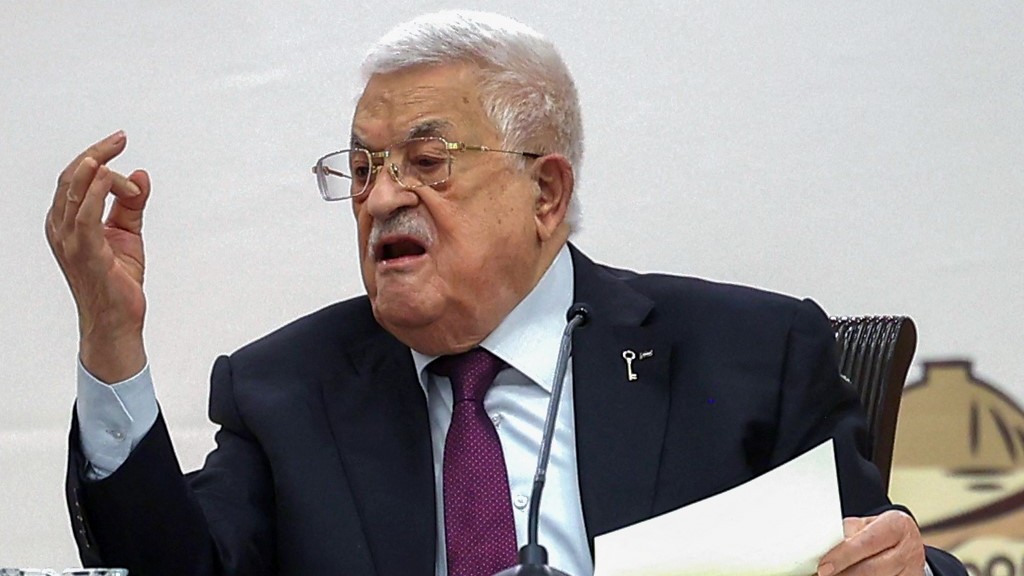Palestinian President Mahmoud Abbas is set to visit Lebanon on 19 May to announce the disarmament of Palestinian resistance factions, by force if necessary, Middle East Eye can reveal.
Palestinian and Lebanese sources told MEE that Abbas will travel to Beirut on an official visit to meet the Lebanon’s President Joseph Aoun and other top officials.
During the trip, the Lebanese government and Abbas will announce the demilitarisation of the Lebanon branch of his own Fatah movement as well as other Palestinian factions based in refugee camps across the country.
Sources said Abbas has already agreed to a plan to remove Fatah’s weapons from the camps.
He will also explicitly call on other Palestinian factions fighting against Israel to disarm.
New MEE newsletter: Jerusalem Dispatch
Sign up to get the latest insights and analysis on
Israel-Palestine, alongside Turkey Unpacked and other MEE newsletters
If these groups refuse, a military operation will target those who defy the Lebanese state’s disarmament orders, the sources said.
Abbas is expected to provide political cover for such an operation under the banner of the Palestinian leadership.
A Palestinian source told MEE that Abbas intends to form a security committee tasked with overseeing the disarmament process and setting a clear timetable for the surrender of weapons.
Should the factions fail to comply with the Lebanese state’s directives and Abbas’ decision, they will lose all organisational and political backing, and will be vulnerable to forcible disarmament.
The sources also revealed that Abbas’ decision to disarm Fatah and other factions followed a Saudi request, conveyed through the Saudi Foreign Minister Faisal bin Farhan Al Saud.
Historic presence
Palestinian resistance groups remain active in Lebanon’s refugee camps due to historic displacement and ongoing political marginalisation.
Following the creation of Israel in 1948 and the subsequent Arab-Israeli wars, around 750,000 of Palestinians were expelled from their homes, with many seeking refuge in Lebanon.
Over time, groups such as Fatah, and later Hamas and the Popular Front for the Liberation of Palestine (PFLP), established a presence in the camps to continue their resistance against Israel.
‘Hamas and other factions will not be allowed to endanger national stability’
– Lebanese Brigadier General Mohammed al-Mustafa
Palestinian refugees in Lebanon are still denied basic civil rights, including access to many professions and the right to own property. With limited opportunities, some join armed factions for protection, livelihood, or political representation.
Palestinians in Lebanon also carry the memory of the 1982 Sabra and Shatila massacre, when Israel-backed Christian Lebanese militiamen killed between 800 and 3,500 civilians, mostly women, children, and the elderly.
The move to disarm the factions is seen as part of a broader effort to reshape Lebanon’s political landscape amid Hezbollah’s relative military decline following Israeli strikes that decapitated much of its leadership in 2024.
Abbas’s visit comes shortly after Lebanon’s top security body issued a warning to Hamas on 2 May, threatening it with “the harshest measures” if it launches attacks on Israel from Lebanese territory.
The statement, delivered by the Higher Defence Council, followed a spate of arrests of Lebanese and Palestinian suspects allegedly involved in cross-border rocket fire targeting northern Israel in recent weeks.
“Hamas and other factions will not be allowed to endanger national stability,” said Brigadier General Mohammed al-Mustafa, reading the council’s official communique. “The safety of Lebanon’s territories is above all.”
Calls for Palestinian disarmament in Lebanon are not new.

Palestine: Mahmoud Abbas appoints Hussein al-Sheikh as vice president and likely successor
Read More »
They date back to the 1980s, when the Lebanese parliament annulled the 1969 Cairo Agreement, which had formalised the PLO military presence in the country.
Signed by Yasser Arafat and the Lebanese government under Egyptian mediation, the agreement granted the PLO the right to resist Israeli occupation from Lebanese territory for nearly two decades.
Abbas has become increasingly vocal in his criticism of Palestinian resistance groups, even as Israel’s war on Gaza, described by Amnesty International as a “live-streamed genocide”, continues.
The 89-year-old president, who recently appointed Hussein al-Sheikh as vice president and likely successor, recently lashed out at Hamas as “sons of dogs” and demanded the group surrender and release all captives held in Gaza, accusing it of giving Israel a pretext to continue its onslaught on Gaza.
At least 52,535 Palestinians have been killed in Israel’s war on Gaza since October 2023, according to the Palestinian health ministry.
In the past 24 hours alone, Israeli strikes killed 40 people and wounded 125, bringing the total number of wounded to 118,491.

